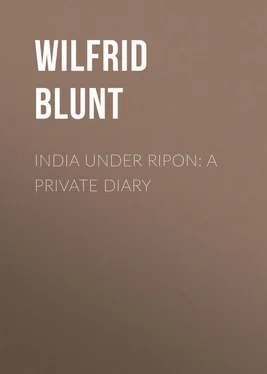Wilfrid Blunt - India Under Ripon - A Private Diary
Здесь есть возможность читать онлайн «Wilfrid Blunt - India Under Ripon - A Private Diary» — ознакомительный отрывок электронной книги совершенно бесплатно, а после прочтения отрывка купить полную версию. В некоторых случаях можно слушать аудио, скачать через торрент в формате fb2 и присутствует краткое содержание. Жанр: foreign_antique, foreign_prose, на английском языке. Описание произведения, (предисловие) а так же отзывы посетителей доступны на портале библиотеки ЛибКат.
- Название:India Under Ripon: A Private Diary
- Автор:
- Жанр:
- Год:неизвестен
- ISBN:нет данных
- Рейтинг книги:4 / 5. Голосов: 1
-
Избранное:Добавить в избранное
- Отзывы:
-
Ваша оценка:
- 80
- 1
- 2
- 3
- 4
- 5
India Under Ripon: A Private Diary: краткое содержание, описание и аннотация
Предлагаем к чтению аннотацию, описание, краткое содержание или предисловие (зависит от того, что написал сам автор книги «India Under Ripon: A Private Diary»). Если вы не нашли необходимую информацию о книге — напишите в комментариях, мы постараемся отыскать её.
India Under Ripon: A Private Diary — читать онлайн ознакомительный отрывок
Ниже представлен текст книги, разбитый по страницам. Система сохранения места последней прочитанной страницы, позволяет с удобством читать онлайн бесплатно книгу «India Under Ripon: A Private Diary», без необходимости каждый раз заново искать на чём Вы остановились. Поставьте закладку, и сможете в любой момент перейти на страницу, на которой закончили чтение.
Интервал:
Закладка:
“Seyd Huseyn is positive that the draft of the proposed new treaty is already at the Residency. He has been shown a copy or précis of it, and believes it will either be forced on the young Nizam as soon as he comes of age, as a condition of his ascending the throne, or that the signature of the Peishkar will be taken before that event. This he thinks could be done legally, as the Council of Regency has sovereign powers. The Council consists of the Peishkar, old and infirm, of Kurshid Jah, the presumptive heir to the throne, both men under the influence of the Residency, and of Bushir-ed-Dowlah, who is without colour or strong character. Young Salar Jung so far is only secretary to the Council, and so without voice in its decisions. I find it difficult, however, to believe that Lord Ripon’s Government would venture to rush so important a treaty through in the last days of the Regency; and I think it far more likely that pressure will be put on the young Nizam, partly by flattery, partly by threats at Calcutta, to get a signature from him simultaneously with his installation. On the other hand, the other important matter insisted upon by the Indian Government, the Railway Convention, has been carried through precisely in this way with the Peishkar, for Cordery told us so himself, and it is possible that Seyd Huseyn may be right, and the attempt on the Berars will be made at once, rather than trust its execution to the Nizam’s subserviency. This decides me to hasten my journey to Calcutta, where I shall lay the whole case before Lord Ripon, and protest against the sharp practice of the Foreign Office diplomacy.
“The existence of the draft treaty at the Residency explains to me what has hitherto seemed inexplicable, the strong support given to the Peishkar, in spite of his misgovernment; the isolation in which Salar Jung is being placed by the dismissal of so many of his father’s best servants; the stories circulated against the character of all those who have advocated the retrocession of the Berar Provinces; Cordery’s words about Laik Ali’s ‘headstrong character’ and that his only chance was to make common cause with the Peishkar; the favour shown to Kurshid Jah as heir to the throne and substitute in case it should be found necessary to get rid of the young Nizam, along with the bad character Cordery attributes to the latter; and the tales of his childishness, of his early corruption with women and other scandals. Cordery at dinner has talked a great deal to Anne on all these matters. It also perhaps explains how the other day, when he had been speaking more severely than usual to Laik Ali, he put his arm paternally on his shoulder and said Laik Ali must forgive him, for he was only following his instructions. He made a sort of apology to Seyd Huseyn, too, when he sent for him the other day. He told him he must leave Hyderabad for six months, but added ‘I am doing you an injustice, but it is necessary in the public interest.’ I exhorted Laik Ali to talk openly of all these things to Lord Ripon when he sees him at Calcutta, and I have promised to urge Lord Ripon to pay full attention to him. As soon as he arrives with the Nizam’s party at Calcutta I will see him and advise him, for none of Laik Ali’s friends are to be allowed to go with him. He has given me printed copies of his father’s private correspondence relating to the Berars and other matters, and will send to me at Bombay a copy of the minute written by his father on the case. It is a curious comment on the little trust placed by the native Government in English administration that he does not send me the minute by post, but will forward it through an agent to be delivered by hand.
“Talking on general matters of government, Laik Ali said that he did not think that the Nizam would be fit to govern the country by himself, as he has thought of doing, but neither is the country fit for self-government. The custom has been that it should be governed by a Minister, and doubtless he intends to be that Minister. I shall do what I can to help him, as he possesses his father’s traditions, and there is no question he is very popular at Hyderabad. His age is his only drawback, as he is little more than twenty-one. I asked him about this particularly, and he said he was born in August, 1862. But he is far older than his years. He has invited us to come back for the Nizam’s installation. The Peishkar’s administration seems to have been signalized by a general round of plunder as in the old time. It is not only from Laik Ali that I know this, but from everybody I have spoken to. When Salar Jung died, Sir Stewart Bailey was sent from Calcutta to settle matters here, and Laik Ali was appointed Co-Administrator with the Peishkar, and as such he ought now to be taking his share in the administration, but this has been prevented. There is no public office at which business is transacted, and the Peishkar will not consult him or let him into his house with any regularity for the discussion of affairs; nor will he send him, as he ought to do, the documents for his signature. The consequence is he is powerless to do or to prevent anything, and he says he will throw up his office if after he has been to Calcutta the position is not altered. He now has the responsibility without the power, and this he refuses to go on with.
“We are beginning to be out of favour at the Residency. Cordery is alarmed at our independent visits to the City. He made a remark two days ago about it to Salar Jung. Perhaps his sudden announcement that he is going to Calcutta may be connected with a suspicion that we know his plans. At four, Rasul Yar Khan came to fetch us to dine with him in the City, a final breach of discipline, as English people going to the City are expected to be bear-led by some one from the Residency. Rasul Yar Khan lives in a little old-fashioned house, with a pretty court surrounded by arches, and we were glad of the opportunity of seeing a bourgeois Hyderabad establishment. He had invited several friends to meet us, Nawaiz Jung, Cheragh Ali, Seyd Huseyn Bilgrami, and Mulvi Mehdy Hassan; and we had some good talk. They told us when Lord Beaconsfield came into office ten years ago, every Mohammedan in India looked to the Conservative party as friendly to them. But Lord Lytton’s policy had undeceived them. The Afghan War had been most displeasing and had estranged every mind, and they had entirely lost confidence in any English party. They talked, too, of a letter Lytton had written to Lord Salisbury, which had been published, explaining how Mohammedans would be excluded from the public service.
“Mehdy Hassan sat next me. He is a native of Lucknow, and told me I should be well received by the Mohammedans there, for they knew my name well, and he has promised to give me letters for some of them. They would be glad to learn the truth about the Egyptian War, for until a few months ago they had all been deceived about it, thinking that the English had really gone to Egypt as the Sultan’s allies. They said I should do well to give a lecture at Calcutta on the subject, but that it would be difficult to get up a public protest against future wars waged with Mohammedans, because, although the thing would be popular, it would be too dangerous for the leaders in it, who would from that moment become marked men. They told me I had no conception of the despotism under which India was held, nor of the danger there was for them in meddling with politics; Jemal-ed-Din’s stories about the deportation of religious Sheykhs to the Andaman Islands were perfectly true. The dinner was a good one, partly European, partly Indian, but we left early in order to appease Mr. Cordery.
“ 10th Dec. – Left Hyderabad by the early train, many of our friends coming to see us off. The Meccan brought us provisions for the road, and the schoolmaster was there, and Sultan Nawaiz’s son. I made them all three sit down on a bench with me, on which Trevor was also seated, a proceeding English officials are not used to. Then Seyd Huseyn Bilgrami and others of the Northern Mohammedans came, and our good little Rasul Yar Khan with his brother insisted on going with us two hours’ journey on our road. He had gone that distance, he said, with Jemal-ed-Din, and would go with us. He sent us some splendid presents last night, including the finest cashmere shawl I ever saw, which we had some difficulty in sending back, as also a box of ostrich feathers from Sultan Nawaiz, which his son brought to the station. But it would never do for us to take presents, though other English travellers it seems do. The Keays and several English also came to the station, and Trevor, who I suspect wanted to know the names of our native friends.
Читать дальшеИнтервал:
Закладка:
Похожие книги на «India Under Ripon: A Private Diary»
Представляем Вашему вниманию похожие книги на «India Under Ripon: A Private Diary» списком для выбора. Мы отобрали схожую по названию и смыслу литературу в надежде предоставить читателям больше вариантов отыскать новые, интересные, ещё непрочитанные произведения.
Обсуждение, отзывы о книге «India Under Ripon: A Private Diary» и просто собственные мнения читателей. Оставьте ваши комментарии, напишите, что Вы думаете о произведении, его смысле или главных героях. Укажите что конкретно понравилось, а что нет, и почему Вы так считаете.












